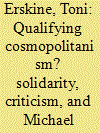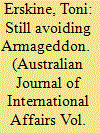|
|
|
Sort Order |
|
|
|
Items / Page
|
|
|
|
|
|
|
| Srl | Item |
| 1 |
ID:
185166


|
|
|
|
|
| Summary/Abstract |
In the face of the current proliferation of existential threats-the risk of nuclear war, anthropogenic climate change, COVID-19, and (arguably) disruptive technologies like artificial intelligence-it is imperative that Australia embrace the notion of shared responsibility in international politics. Individual states have limited capacities to effectively tackle such large-scale, complex emergencies on their own. Highlighting the moral implications of the philosophical notion of joint action, this commentary makes the case for a particular type of responsibility, which can only be discharged when states deliberate and coordinate their actions. Moreover, it explores what this notion of shared responsibility means for Australia-and its international relationships-with respect to responding to climate chaos and COVID-19. Even though Australia, acting on its own, can neither significantly mitigate climate change nor halt the current global pandemic, it nevertheless has demanding moral responsibilities to respond to both. This is because the capacities necessary to affect meaningful change can be created through collaboration with other institutional agents. In the absence of intergovernmental organizations able to respond effectively to such crises, Australia has shared responsibilities to contribute to establishing, and then acting as part of, informal, purpose-driven, climate change and COVID-19 ‘coalitions of the obligated’.
|
|
|
|
|
|
|
|
|
|
|
|
|
|
|
|
| 2 |
ID:
079474


|
|
|
|
|
| Publication |
2007.
|
| Summary/Abstract |
For some, cosmopolitanism is a deeply troubling, even dangerous, ethical position. An 'embedded cosmopolitan' variation on this position would strive to take seriously the apprehensions of these critics by eschewing the impartialist perspective to which it is conventionally tied. Specifically, this proposed alternative would adopt a modified version of the particularist moral starting point espoused by so-called 'communitarian' political theorists. In order to retain its ethical cosmopolitan credentials, such a stance would have to achieve a moral purview that left no-one, whether compatriot or foreigner, ally or enemy, beyond either concern or comprehension. Trying to construct this qualified cosmopolitanism is a difficult and daunting task. By analysing the various attempts of the American political philosopher Michael Walzer to reconcile a radically situated account of morality (his 'view from the cave') with an inclusive and cross-culturally critical moral purview, this article aims to map the most promising route towards an embedded cosmopolitan position. At the same time, it endeavours to pay due attention to a much broader range of Walzer's writings than is generally acknowledged within the study of international relations
|
|
|
|
|
|
|
|
|
|
|
|
|
|
|
|
| 3 |
ID:
183508


|
|
|
|
|
| Summary/Abstract |
Frequently inspired by the spectre of existential risk, Australian IR scholars have made – and continue to make – a crucial contribution to the evolution of normative IR theory. In defending this position, this article takes three steps. First, it outlines key catalysts that prompted the emergence of this sub-field as a distinct and self-aware area of study approximately forty years ago and refines the story of its genesis by recognising pioneering Australian contributions. Second, it turns to the previous generation of Australian IR to explore the work of two prominent scholars – and ‘neglected antecedents’ – who both prefigured and helped to establish the intellectual context for normative IR theory. Specifically, it focuses on the scholarship of Coral Bell and Hedley Bull and maintains that the classical approach and interpretive methodology that their work exemplified and fostered was particularly conducive to the subsequent development of a sub-field focused on questions of international ethics. Finally, this article contemplates the future of normative IR theory in Australia by highlighting its current flourishing, acknowledging the seemingly intractable practical challenges that it must address, and proposing that it might better confront them by turning to a hitherto overlooked Australian ethical perspective.
|
|
|
|
|
|
|
|
|
|
|
|
|
|
|
|
| 4 |
ID:
070158


|
|
|
|
|
|
|
|